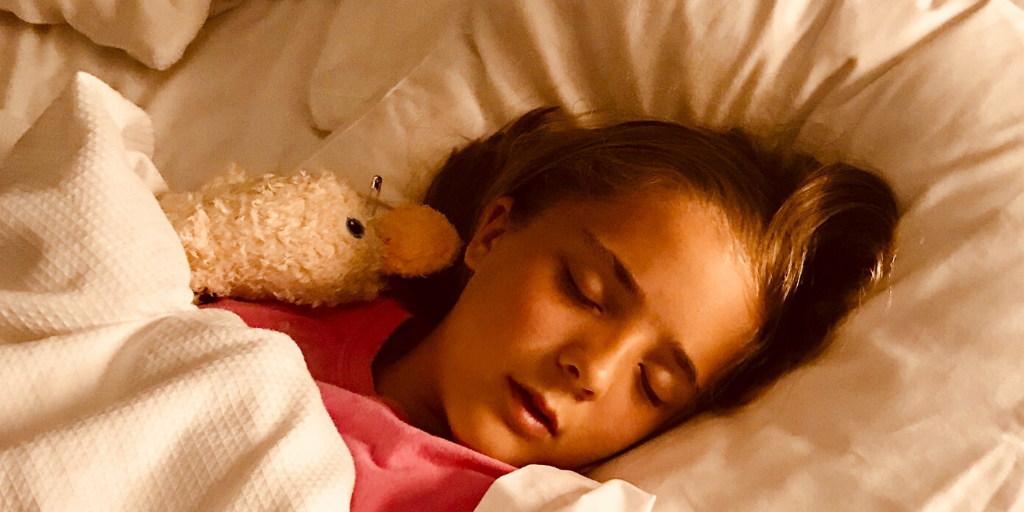“There is a time for many words, and there is also a time for sleep.”* Why enough sleep is essential for speech and language learning
When assessing and treating children and adults with communication disorders, speech pathologists need to ask more questions about sleep.
Why?
Sleep is critical for mental and physical health. Both sleep quality and quantity are important for memory and learning (Antony & Paller, 2017). Memory and learning ability are, in turn, essential for speech-language therapy to work (Morrow & Duff, 2020).
Sleep supports memory
To remember and use something you have learned, you need to:
- encode it: convert the information into a new memory or mental representation that can be stored by the brain;
- consolidate it: strengthen and stable the memory in the neocortex; and
- retrieve it: access the memory.
Sleep may play a role in all these phases of memory, but it seems to be particularly important to the consolidation of newly learned information (e.g. Anthony & Paller, 2017; Stickgold, 2005).
Sleep disturbances affect learning
Sleep disturbances of any kind have been linked to brain changes and associated disturbances in functional cognition. People with even mild sleep problems or poor sleep habits may have problems with cognition. For example, sleep quality and quality have been linked to student learning capacity and academic performance across settings and age groups (e.g. Curcio et al., 2006; Eliasson et al., 2002; Sadeh et al., 2000; and Trockel et al., 2000).
Memory supports language learning
Some researchers think that language learning depends on two learning and memory systems, which have been co-opted for language:
- declarative memory, associated with explicit learning and knowledge that is available to conscious awareness, underlying knowledge about words (semantic memory) and events (episodic memory); and
- procedural memory: associated with implicit, unconscious learning and processing of a wide range of perceptual, motor and cognitive skills and tasks (e.g. Kamhi, 2020, and Ullman, 2016).
There is a growing body of research suggesting that developmental language disorders in children may be caused by a deficient procedural memory system. This would explain, for example, some of the difficulties many children with language disorders have understanding and applying the rules that comprise syntax, morphology, and the phonology of a language (e.g. Ullman & Pierpont, 2005).
However, the two systems interact with each other in complex and, as yet, not well understood ways, and some researchers do not agree with the procedural-declarative memory account of developmental language disorders (e.g. Goffman & Gerken, 2020).
In any event, research suggests that sleep supports nearly every type of memory, including:
- declarative memories and language learning (e.g. Antony & Paller, 2017; Batterink & Paller, 2017; Cousins & Fernandez, 2019); and
- procedural memories (e.g. Huber et al., 2004; Tamaki et al., 2008).
Taken together, this evidence suggests that undisturbed sleep plays a critical role in speech-language therapy success, including learning and retaining new vocabulary (e.g. Dumay & Gaskell, 2007) and complex language tasks, like full narratives (e.g. Antony & Paller, 2017).
Sleep disturbances and communication disorders often co-occur
Although there is good research linking sleep and learning in typically developing individuals, more studies are needed looking at the effects of sleep disturbances on people with communication disorders.
We know that individuals with impaired development and/or brain injuries are at an increased risk for sleep disturbance. Sleep disturbance frequently co-occurs with:
- Developmental Language Disorder (e.g. McGregor, 2014; McGregor & Alper, 2015);
- Autism Spectrum Disorder (e.g. Liu et al., 2006; Schreck et al., 2004);
- Down Syndrome (e.g. Carter et al., 2009);
- Parkinson’s Disease (e.g. Chaudhuri et al., 2006; Kumar et al., 2002); and
- Neurogenic disorder such as:
- dementia with Lewy bodies (e.g. Murray et al., 2013);
- traumatic brain injury (TBI), with up to 50% of TBI patients having a sleep disturbance (e.g. Dachtyl & Morales, 2017; Lundine et al., 2019; Mathias & Alvaro, 2012); and
- stroke (e.g. Hermann et al., 2008).
Speech therapy is dependent on memory and learning ability. As such, sleep disturbance can interfere with our clients’ ability to participate in therapy.
What should we ask more about? Clinical symptoms of possible sleep disturbance
When assessing and treating clients, speech pathologists should ask more questions to probe whether the client exhibits any of the following symptoms of a possible sleep disturbance:
- Difficulty falling or staying asleep.
- Daytime somnolence (excessive tiredness or falling asleep during the day).
- Shortness of breath or headaches on waking.
- Irregular sleep and wake cycles.
- Anxiety or irritability.
- Difficulties concentrating.
(Mayo Clinic, 2019; Goel et al., 2009).
Common types of sleep disorders
Speech pathologists should be aware of the main categories of sleep disturbances:
- Insomnias, an inability to fall asleep.
- Hypersomnias, excessive sleepiness, falling asleep at inappropriate times.
- Sleep-related breathing disorders, e.g. difficulties breathing during sleep, such as obstructive sleep apnoea.
- Circardian rhythm sleep-wake disorders, meaning misaligned sleep schedules, e.g. where people do not sleep regular hours.
- Parasomnias, being unwanted events or experiences that occur while falling asleep, sleeping or waking up.
- Sleep movement disorders, being movements during or prior to sleep that make it difficult to fall asleep, stay asleep or get a restful sleep.
Clinical bottom line
Speech pathologists don’t treat sleep disturbances. But we need to know the signs and symptoms of possible sleep disturbances so that we can refer clients with suspected sleep difficulties to the right professionals to get the right help.
Untreated sleep disturbances can get in the way of our clients achieving their speech therapy goals. Speech pathologists should:
- ask about sleep as part of their clinical protocol, consider its clinical effects, and refer clients for medical follow-up as warranted (McGregor & Alper, 2015); and
- help to educate clients, families and the general public about how sleep disturbances may affect memory and learning (including speech and language learning) (Morrow & Duff, 2020).
Related articles
- Developmental Language Disorders
- Does my child have a language disorder? 6 questions speech pathologists should ask before assessment
- Speaking for themselves: why I choose ambitious goals to help young children put words together
Principal sources
Morrow, E.L, & Duff, M.C. (2020). Sleep Supports Memory and Learning: Implications for Clinical Practice in Speech-Language Pathology. Am J Speech Lang Pathol. 2020 Mar 23:1-9. doi: 10.1044/2019_AJSLP-19-00125.
Kamhi, A.G. (2019). Speech-language development as proceduralization and skill learning: Implications for assessment and treatment. Journal of Communication Disorders 82, 105918. doi: https://doi.org/10.1016/j.jcomdis.2019.105918. Epub 2019 Jul 6.
More information
- National Healthy Sleep Awareness Project
- Mayo Clinic on Sleep Disorders, including symptoms and causes
* “There is a time for many words, and there is also a time for sleep.” – Homer, The Odyssey
Related quotation: “It is a common experience that a problem difficult at night is resolved in the morning after the committee of sleep has worked on it.” – John Steinbeck
Image: https://tinyurl.com/rlt65v7

Hi there, I’m David Kinnane.
Principal Speech Pathologist, Banter Speech & Language
Our talented team of certified practising speech pathologists provide unhurried, personalised and evidence-based speech pathology care to children and adults in the Inner West of Sydney and beyond, both in our clinic and via telehealth.








